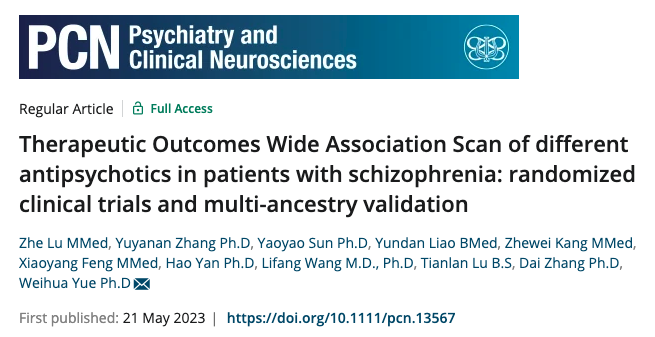Prof. Weihua Yue: Therapeutic Outcomes Wide Association Scan of different antipsychotics in patients with schizophrenia: randomized clinical trials and multi-ancestry validation

Abstract
Aim
This study identified discrepant therapeutic outcomes of antipsychotics.
Methods
A total of 5191 patients with schizophrenia were enrolled, 3030 as discovery cohort, 1395 as validation cohort, and 766 as multi-ancestry validation cohort. Therapeutic Outcomes Wide Association Scan was conducted. Types of antipsychotics (one antipsychotic vs. other antipsychotics) were dependent variables, therapeutic outcomes including efficacy and safety were independent variables.
Results
In discovery cohort, olanzapine related to higher risk of weight gain (AIWG, OR: 2.21 ~ 2.86), liver dysfunction (OR: 1.75 ~ 2.33), sedation (OR: 1.76 ~ 2.86), increased lipid level (OR: 2.04 ~ 2.12), and lower risk of extrapyramidal syndrome (EPS, OR: 0.14 ~ 0.46); risperidone related to higher risk of hyperprolactinemia (OR: 12.45 ~ 20.53); quetiapine related to higher risk of sedation (OR = 1.73), palpitation (OR = 2.87), increased lipid level (OR = 1.69), lower risk of hyperprolactinemia (OR: 0.09 ~ 0.11), and EPS (OR: 0.15 ~ 0.44); aripiprazole related to lower risk of hyperprolactinemia (OR: 0.09 ~ 0.14), AIWG (OR = 0.44), sedation (OR: 0.33 ~ 0.47), and QTc prolongation (β = −2.17); ziprasidone related to higher risk of increased QT interval (β range: 3.11 ~ 3.22), nausea (OR: 3.22 ~ 3.91), lower risk of AIWG (OR: 0.27 ~ 0.46), liver dysfunction (OR: 0.41 ~ 0.38), and increased lipid level (OR: 0.41 ~ 0.55); haloperidol related to higher risk of EPS (OR: 2.64 ~ 6.29), hyperprolactinemia (OR: 5.45 ~ 9.44), and increased salivation (OR: 3.50 ~ 3.68). Perphenazine related to higher risk of EPS (OR: 1.89 ~ 2.54). Higher risk of liver dysfunction in olanzapine and lower risk of hyperprolactinemia in aripiprazole were confirmed in validation cohort, and higher risk of AIWG in olanzapine and hyperprolactinemia in risperidone were confirmed in multi-ancestry validation cohort.
Conclusion
Future precision medicine should focus on personalized side-effects.
Original link: https://onlinelibrary.wiley.com/doi/10.1111/pcn.13567